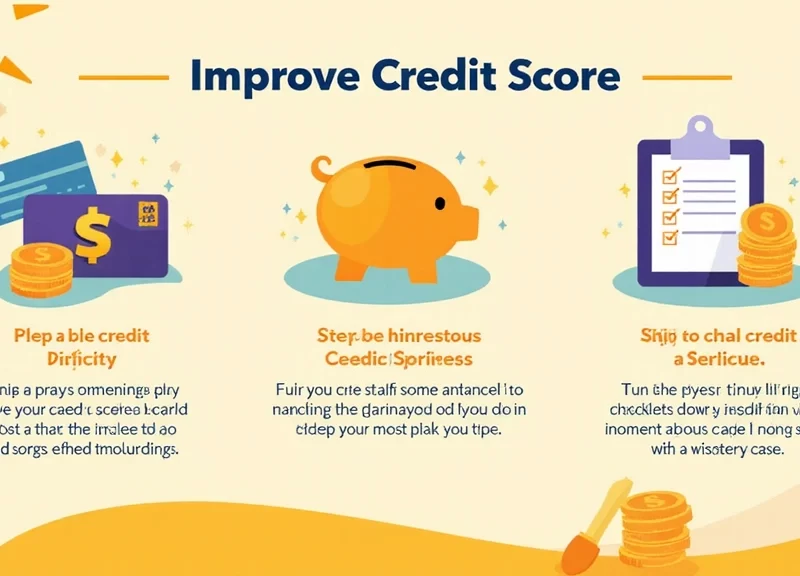Managing money can feel like a complex maze, but it doesn’t have to be. With the right personal finance tips, anyone can take control of their financial future and make informed decisions that lead to greater financial literacy.
This article is packed with 19 essential personal finance tips that will inspire you to rethink your money habits. Whether you’re just starting out or looking to refine your existing strategies, you’ll discover insights that can change your financial trajectory.
From budgeting techniques to investment strategies, these tips will help you navigate the world of finance with confidence. Remember, some of these tips might surprise you—especially #5, which will definitely make you think twice about how you handle your money!
1. Create a Budget You Can Stick To

A budget serves as the foundation for achieving financial stability. Establishing a budget might seem overwhelming at first, but it’s really about gaining insight into your spending habits. Begin by outlining your income alongside your fixed expenses, such as rent and utilities. Next, track your variable expenses—like groceries and entertainment—to identify areas where you can cut back.
Utilizing budgeting tools can significantly enhance your budgeting experience. Consider subscribing to a budgeting app, such as this budgeting app, which can help you visualize your spending patterns effectively. Alternatively, for those who prefer a more traditional approach, a financial planner notebook can be a great way to keep your budget organized and easily accessible.
To ensure you stick to your budget, set realistic goals for each category, review your budget monthly to make necessary adjustments, and keep it visible as a constant reminder. Additionally, rewarding yourself for adhering to your budget can make the process more enjoyable; a small treat can go a long way in maintaining motivation. For a more structured approach, consider using an expense tracking spreadsheet to monitor your expenditures. By actively managing your budget, you’ll develop healthier money habits that pave the way for long-term financial success.
2. Build an Emergency Fund

An emergency fund serves as your financial safety net for those unexpected expenses that life throws your way. Whether it’s an unforeseen medical bill or urgent car repairs, having money set aside can prevent you from falling into financial distress. Aim to save at least three to six months’ worth of living expenses to ensure you’re prepared for anything that comes your way.
Start small by setting aside a specific amount each month, even if it’s just $50. You’ll be amazed at how quickly those contributions accumulate over time. It’s advisable to keep this fund in a separate high-interest savings account to minimize the temptation to dip into it for non-emergencies.
To effectively build your emergency fund, consider automating your savings to make the process effortless. You could also explore taking on a side hustle to increase your savings rate. Plus, using any unexpected windfalls—like tax refunds—can significantly boost your fund. Don’t forget to review your monthly expenses for extra savings opportunities.
By having an emergency fund, you’ll feel a sense of security that allows you to tackle life’s surprises head-on without resorting to debt. For those looking to enhance their financial knowledge, consider reading a finance management book or enrolling in a personal finance course to further develop your money management skills.
3. Understand Your Credit Score

Your credit score is much more than just a numerical value; it serves as a crucial indicator of your overall financial well-being. Understanding how credit scores function is essential for making informed financial choices, as a higher score can unlock opportunities such as more favorable mortgage rates, reduced insurance premiums, and even enhanced employment prospects.
To keep track of your credit score, make it a habit to check it regularly using free resources like credit monitoring services or websites such as AnnualCreditReport.com. Familiarize yourself with the key factors that affect your score, including payment history, credit utilization, and the length of your credit history.
Improving your credit score can be a straightforward process. Start by ensuring you pay your bills on time to avoid incurring late fees. Additionally, strive to keep your credit card balances low and limit the number of new accounts you open at once. Regularly review your credit report for any inaccuracies and dispute them if necessary. For in-depth strategies on enhancing your financial literacy, consider a financial literacy guide that can provide valuable insights.
By maintaining a healthy credit score, you will pave the way for better financial opportunities in the future. If your credit score needs improvement, you might also explore credit repair services to help you navigate and rectify any issues.
4. Learn About Investing

Investing is an essential strategy for anyone looking to build wealth, and it’s not reserved solely for the affluent. By starting early, you can harness the power of compound interest, which can significantly amplify your returns over time. To kick off your investment journey, it’s crucial to familiarize yourself with the fundamentals of stocks, bonds, and mutual funds.
One effective way to begin is by opening a retirement account, such as a 401(k) or an IRA, both of which come with valuable tax benefits. If you’re looking for resources to enhance your knowledge, consider picking up some investment books that cover key concepts and strategies. Additionally, there are many user-friendly platforms like Robinhood or Acorns that enable you to start investing with minimal funds.
Here are some actionable tips to help you embark on your investment journey: Start small; even setting aside $10 a week can accumulate into a substantial amount over time. Diversifying your portfolio is crucial to mitigating risks, and staying updated on market trends will empower you to make informed decisions. For those seeking a more structured approach, exploring online investment courses can provide valuable insights tailored to your financial goals.
Lastly, consider investing in a stock market app subscription to keep track of your investments and market movements conveniently. Although investing may initially feel daunting, taking incremental steps can lead to significant financial growth over time.
5. Rethink Your Spending Habits (Eye-Opening!)

This tip has the potential to completely transform your financial landscape. Have you ever stopped to think about how your daily habits influence your finances? Small purchases may seem insignificant at first, but they accumulate over time. Rethinking your spending involves critically evaluating whether you genuinely need that daily coffee or those spontaneous online purchases.
To kickstart this process, consider maintaining a spending journal for a month, where you document every transaction. By the end of the month, take a moment to analyze your spending patterns. You might be astonished by the amount spent on non-essential items. This newfound awareness can catalyze substantial changes in your financial habits.
To assist you on this journey, a spending tracker app can be a valuable tool. Additionally, personal finance coaching can provide you with tailored strategies to enhance your financial management skills, which you can find here.
Moreover, incorporating a mindfulness journal can help you reflect on your spending habits and reinforce your commitment to more intentional purchasing.
By becoming more mindful of your spending, you’ll be empowered to redirect funds toward savings and investments, leading to a significant improvement in your overall financial health.
6. Use Coupons and Cashback Offers

Coupons and cashback offers can truly be invaluable when it comes to managing your finances and saving money. With the convenience of digital couponing today, finding discounts on your everyday purchases has never been easier. Apps like Ibotta and Rakuten provide opportunities to earn cashback on groceries and online shopping, making it simple to put more money back in your pocket.
To enhance your savings further, consider subscribing to a couponing app that keeps you updated on the latest offers. Additionally, signing up for newsletters from your favorite stores can grant you access to exclusive coupons that you won’t want to miss. Always take a moment to search for available discounts before making a purchase; even small savings can accumulate over time and help you stretch your budget further.
Here are some effective strategies to ensure you maximize your savings: always check for coupons prior to making a purchase, combine store discounts with manufacturer coupons for even greater savings, and consider using cashback credit cards to earn additional rewards on your spending. You can also refer friends to cashback apps for bonus offers, enhancing your savings even more.
By integrating coupons and cashback offers into your shopping routine, you’ll be able to save money without compromising on the items you love. For those looking for more comprehensive strategies, a money-saving guide can provide you with further insights and techniques to optimize your financial habits.
7. Set Financial Goals

Setting financial goals provides you with a clear roadmap for managing your money effectively. Whether your aspirations include purchasing a home, saving for retirement, or exploring the globe, having specific objectives will keep you motivated. Begin by identifying your short-term, medium-term, and long-term goals, and consider using a goal-setting planner to organize them.
Once you’ve outlined your goals, break them down into actionable steps. For instance, if you’re aiming to save for a vacation, calculate how much you need to set aside each month to reach your desired amount. You might also find a vision board kit helpful in visualizing your dreams and keeping your focus sharp.
To effectively set and achieve your financial goals, remember to make your objectives SMART—Specific, Measurable, Achievable, Relevant, and Time-bound. Regularly review and adjust your goals to stay in sync with your life changes, and don’t forget to celebrate small milestones along the way to maintain your motivation. Sharing your goals with a trusted friend or family member can also provide a layer of accountability. If you need additional guidance, consider investing in financial coaching sessions to help you stay on track. By establishing clear financial goals, you’ll create a pathway to achieving your dreams.
8. Educate Yourself on Financial Literacy

Financial literacy is crucial for anyone aiming to manage their finances effectively. It encompasses a variety of essential concepts, including budgeting, saving, investing, and debt management. By increasing your financial knowledge, you empower yourself to make informed and confident decisions regarding your money.
To kickstart your journey, consider exploring financial literacy books that can provide foundational insights and strategies. Additionally, online platforms like Khan Academy and Coursera offer free resources, and you can also look into online course subscriptions that delve deeper into personal finance topics.
Engaging with your community can further enhance your learning. Join online forums or attend local budgeting workshops to gain practical knowledge and share experiences. Make a list of financial subjects you want to explore, and don’t hesitate to discuss what you’ve learned with friends to reinforce your understanding. By dedicating time to educate yourself, you’ll be well-equipped to make smarter financial choices.
9. Avoid Impulse Buying

Impulse buying can quickly undermine your budget and lead to unnecessary debt. To combat this tendency, it’s essential to practice mindfulness while shopping. Before you make a purchase, take a moment to assess whether the item is a genuine need or just a fleeting want.
One effective strategy is the 30-day rule: if you feel the urge to buy something, wait 30 days before deciding. This pause allows you to reflect on the necessity of the purchase.
To further guard against impulse buys, consider implementing the following tips: create a shopping list and stick to it, which you can plan out using a helpful shopping list planner. Additionally, avoid shopping when you’re feeling emotional or stressed, as these states can cloud your judgment. Limiting your exposure to marketing and advertisements can also help curb impulsive purchases.
For those looking to enhance their mindfulness, a mindfulness guide can provide valuable techniques to stay grounded while shopping. Lastly, consider using cash instead of credit cards to make purchases, as this can help you stay within your budget.
By being intentional about your spending and utilizing resources like an anti-impulse buying workbook, you can save money and allocate it towards your long-term financial goals.
10. Negotiate Bills and Expenses

Negotiating your bills might seem daunting, but it can result in substantial savings that significantly impact your finances. Many service providers, including those for cable, internet, and insurance, are often open to negotiation, especially if you come prepared with information about competitors’ rates.
To bolster your negotiation skills, consider picking up a comprehensive negotiation guidebook that can equip you with effective strategies and techniques. When you contact your service providers, remember to be polite yet assertive, emphasizing your value as a loyal customer. If they are unwilling to lower your rates, don’t shy away from mentioning the possibility of switching to a competitor.
Additionally, if you find the process overwhelming, you might explore professional help through bill negotiation services that specialize in securing better rates for clients. Always ask to speak with a supervisor if necessary, and make it a habit to follow up regularly to ensure your rates stay competitive. By actively negotiating your bills, you can reduce your monthly expenses, freeing up funds for savings or investments, and you might even benefit from using financial planning apps to track your progress.
11. Automate Your Savings

Automation is an incredibly effective strategy in personal finance management. By setting up automated savings, you can ensure that a designated portion of your income is transferred directly into your savings account before it even hits your checking account. This means you can focus on your expenses without the temptation to spend what you intended to save. You might want to explore using automated savings apps like Qapital or Digit, which allow you to save effortlessly and are particularly useful for building an emergency fund or working towards future financial goals.
To make the most of your automated savings, consider these tips: first, determine a fixed percentage or amount to save each month. Regularly review your automated savings plan to ensure it aligns with your financial objectives. Setting up alerts can also help you keep track of your progress. Additionally, you should think about increasing your savings rate each time you receive a raise.
For those looking to manage their finances more effectively, consider investing in personal finance management software like this option to help you track your expenses and savings goals. Also, using a savings goal tracker, such as the one available here, can keep you motivated and on track to achieving your financial aspirations. By automating your savings, you’ll be able to build wealth effortlessly over time.
12. Understand Debt Management

Managing debt can be a daunting task, but it is essential for maintaining your financial well-being. The first step is to create a comprehensive list of all your debts, including their interest rates and minimum payments. This will provide you with a clear overview of what you owe and help you devise a repayment strategy.
Consider implementing methods such as the snowball method, which encourages you to pay off the smallest debts first, or the avalanche method, which prioritizes high-interest debts. Whatever strategy you choose, it’s important to formulate a plan and commit to it.
To enhance your debt management efforts, you might find valuable resources like debt management books incredibly helpful. These can provide insights and techniques tailored to your specific financial situation. Additionally, utilizing personal finance apps can assist you in tracking your progress and staying organized.
Make sure to always make at least the minimum payment to prevent penalties, and consider consolidating high-interest debts into a lower-interest loan. It’s advisable to refrain from accumulating new debt while working on paying off existing obligations. Lastly, don’t forget to celebrate your milestones along the way; this will help keep you motivated on your journey to financial freedom. By taking control of your debt, you will be setting yourself up for a healthier financial future, and if you need additional guidance, financial counseling services can provide the support you need.
13. Make Use of Financial Apps

In today’s digital era, financial apps have revolutionized the way we manage our money, offering simplicity and efficiency like never before. Whether you need help with budgeting, such as using budgeting tools, or want to dive into investing with platforms like Acorns, there’s an app tailored for every financial need.
Popular choices like Mint can provide valuable insights into your spending habits, empowering you to make informed financial decisions. Plus, these apps often come with useful features that alert you to unusual spending patterns or help you track your progress toward achieving your financial goals.
To maximize the benefits of financial apps, consider the following tips:
– Select apps that resonate with your financial objectives.
– Regularly review the data provided by your apps to remain informed about your finances.
– Take advantage of features such as reminders and alerts for upcoming payments.
– Don’t hesitate to explore additional options, including financial app subscriptions, to find what best suits your unique needs.
By effectively leveraging these resources, including insightful money management guides, you can gain better control over your finances and enhance your financial literacy.
14. Review Your Financial Situation Regularly

Managing your finances effectively requires consistent attention, much like any other important goal. To keep your financial health in check, consider scheduling a monthly review of your budget, savings, and investments. This dedicated time will allow you to assess your progress, adjust your strategies, and remain aligned with your financial aspirations.
During your review, take a close look at your spending habits and savings achievements, and consider any new financial objectives that may have come to light. It’s also an excellent opportunity to evaluate your financial knowledge and identify areas where you might benefit from further education. To make your financial reviews more productive, you might find it helpful to use a financial review checklist to ensure you cover all essential components, and employing budgeting software can streamline this process significantly.
Don’t forget to set aside a quiet, distraction-free time for your review. Celebrate even the smallest of successes and be ready to make necessary adjustments to your budget or savings plans based on your findings. By incorporating personal finance planning tools into your routine, you’ll be better equipped to stay proactive and maintain control over your financial journey.
15. Seek Professional Financial Advice

Sometimes, navigating the complex world of personal finance can feel overwhelming. Seeking professional financial advice can provide you with tailored insights to help you make informed decisions that align with your unique needs. A financial advisor can guide you through various aspects such as investments, retirement planning, and tax strategies.
When selecting a financial advisor, it’s important to find someone who is certified and has a strong reputation in the field. Be clear about your goals and expectations to ensure that the advisor is the right fit for you.
To enhance your financial knowledge, consider exploring investment planning books and retirement planning guides that can provide valuable insights and strategies.
Here are some tips for working effectively with a financial advisor:
– Prepare a list of questions and topics you want to discuss.
– Understand the fee structure and what services are included.
– Keep an open mind to their suggestions and strategies.
– Regularly revisit your plans to ensure they remain aligned with your evolving goals.
By seeking professional guidance, you can gain clarity and confidence in your financial journey, allowing you to make informed decisions and secure your financial future. For comprehensive financial advisory services, consider checking out financial advisory services that can help you navigate your financial landscape.
16. Stay Informed About Economic Trends

Understanding economic trends is crucial for making informed financial decisions that can significantly impact your savings and investments. By keeping a close eye on interest rates, inflation, and market fluctuations, you empower yourself to make timely choices—like knowing when to refinance your mortgage or adjusting your investment portfolio accordingly.
To stay updated, consider subscribing to reputable financial news services that deliver insights right to your inbox. Reading insightful economic trend analysis books can also deepen your understanding and help you spot potential opportunities in the market.
Additionally, participating in online investment webinars can provide you with expert knowledge and practical strategies to enhance your financial literacy. Set aside time each day or week to engage with this material, follow thought leaders on social media, and discuss financial topics with knowledgeable friends or family.
By remaining informed, you can navigate your financial future with increased confidence and clarity.
17. Utilize Tax-Advantaged Accounts

Tax-advantaged accounts offer substantial advantages for your savings and investments, making them a crucial component of effective financial planning. Accounts such as 401(k)s, IRAs, and HSAs provide valuable tax benefits that can significantly improve your overall financial health. By contributing to these accounts, not only can you bolster your savings for retirement or healthcare needs, but you can also lower your taxable income.
It’s essential to familiarize yourself with the contribution limits and specific benefits associated with each type of account. For example, employer-sponsored 401(k)s often come with matching contributions, which equate to free money that can enhance your retirement savings.
To make the most of your tax-advantaged accounts, consider these strategies: ensure you contribute enough to receive the full employer match if it is available, and think about maximizing your contributions to IRAs for added tax benefits. Keeping track of contribution deadlines is also vital to avoid missing out on these advantages. Additionally, consulting a tax professional can provide personalized strategies to optimize your savings.
To help you navigate this process, you might find it beneficial to explore tax planning software that can streamline your financial management. For deeper insights, consider picking up retirement account guides that outline the best practices for maximizing your contributions. Lastly, enhancing your investment knowledge with investment strategy books can equip you with the tools you need to make informed decisions. By leveraging these resources and utilizing tax-advantaged accounts, you can effectively enhance your savings while minimizing your tax burden.
18. Practice Mindful Spending

Mindful spending is all about being deliberate with your finances and ensuring that every dollar you spend reflects your values and aligns with your financial goals. Instead of shopping on autopilot, take a moment to thoughtfully evaluate each potential purchase. This mindful approach helps you to not only consider whether an item is truly necessary but also how it fits into your overall budget.
Before making a purchase, ask yourself if the item is essential and explore alternatives such as renting or borrowing instead of buying. To assist you in this journey, you might find a mindfulness spending journal helpful for tracking your spending habits and reflecting on your values.
Additionally, consider seeking guidance through personal finance coaching which can provide you with tailored strategies for mindful spending. Utilizing budgeting apps can also streamline your budgeting process and help you stick to your financial objectives.
Here are some practical tips to enhance your mindful spending: reflect on your values and how they align with your expenditures, avoid shopping during emotional times, maintain a list of must-have items, and regularly review your purchases to determine their true value. By committing to mindful spending, you will cultivate a more enriching and fulfilling financial life.
19. Create a Financial Vision Board

Visualizing your financial aspirations can serve as a significant source of motivation. By creating a financial vision board that encapsulates your dreams—be it owning a home, traveling the world, or saving diligently for retirement—you can keep your goals front and center. Use a combination of inspiring images, meaningful quotes, and symbols that resonate with your desired outcomes.
To get started, consider utilizing vision board kits that provide all the essentials for crafting your board. Additionally, stock up on art supplies for crafting to personalize your vision board further and make it a true reflection of your ambitions.
Place your board in a location where you’ll see it every day as a constant reminder of your financial journey. Remember to be specific about your goals to enhance their tangibility, and don’t hesitate to read motivational books that can inspire you along the way. Regularly updating your vision board to include new dreams will keep it relevant, and sharing it with friends or family can add an extra layer of accountability. By investing time in creating a financial vision board, you’ll maintain focus and motivation to achieve your financial goals.
Conclusion

Rethinking your money habits is the first step toward a more secure financial future. By implementing these 19 personal finance tips, you’ll not only enhance your financial literacy but also develop a healthier relationship with money.
Remember, every small change can lead to significant improvements over time. Start today by choosing a tip that resonates with you and take action! Your financial future is in your hands.
Note: We aim to provide accurate product links, but some may occasionally expire or become unavailable. If this happens, please search directly on Amazon for the product or a suitable alternative.
This post contains Amazon affiliate links, meaning I may earn a small commission if you purchase through my links, at no extra cost to you.
13 Stunning DIY Coffee Table Ideas That Will Transform Your Living Room (You Won’t Believe #5!)


